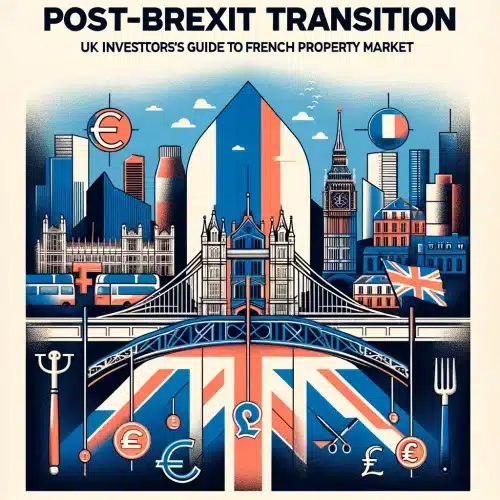Knowledge and Resources
Navigating New Horizons: A Post-Brexit Guide for UK Investors in the French Property Market

Brexit has undeniably reshaped the landscape of international investments for UK citizens, introducing a new array of challenges and considerations, especially in the realm of real estate investment in France. The fluctuations in exchange rates, changes in legal regulations, and the subsequent need for new financing strategies have placed UK investors at a crossroads. This guide aims to navigate through these waters, offering clarity and direction for UK nationals looking to invest in the French property market post-Brexit.
Understanding the Impact of Brexit on UK Investors
Brexit’s immediate aftermath saw significant volatility in exchange rates, directly affecting the purchasing power of UK investors in the Eurozone. The pound’s fluctuation against the euro remains a critical factor for investment decisions, influencing the overall affordability and potential return on investment in the French property market.
Moreover, Brexit has altered the legal standing of UK nationals within the EU, transitioning from EU citizens to non-EU nationals. This change impacts the ease of property acquisition, residency rights, and the potential imposition of different tax rates or requirements for UK investors in France.
Financing Strategies in the Post-Brexit Landscape
Securing financing for a property purchase in France as a UK national has become more complex post-Brexit. French banks may now require more extensive documentation and proof of income and assets from UK borrowers, reflecting the perceived increased risk of lending to non-EU nationals.
Interest rates for loans may also vary, with potential disparities between rates offered to EU versus non-EU nationals. Engaging with international mortgage brokers who specialize in French property transactions can provide a pathway to navigating these changes, ensuring UK investors access competitive financing options.
Navigating Legal Obligations and Tax Implications
The legal obligations for UK property buyers in France now align more closely with those of other non-EU investors. This includes potential scrutiny under France’s wealth tax (Impôt sur la Fortune Immobilière) for property portfolios exceeding a certain value and the need to comply with new residency requirements for those looking to spend significant time in their French properties.
Moreover, tax considerations for rental income, capital gains, and inheritance have been impacted by Brexit. It’s advisable for UK investors to consult with tax professionals experienced in Franco-British fiscal matters to ensure compliance and strategic tax planning.
Embracing the French Lifestyle Post-Brexit
Despite the challenges, France’s allure remains strong for UK investors, offering a lifestyle and culture that many find irresistible. The French real estate market, known for its stability and long-term growth potential, continues to attract those looking to own a piece of its rich cultural tapestry, from the lavender fields of Provence to the chic streets of Paris.
The post-Brexit era presents a new set of challenges for UK investors in the French property market. However, with informed planning, careful navigation of financing and legal pathways, and strategic partnerships, these hurdles can be surmounted. The enduring appeal of French real estate, combined with the resilience and determination of UK investors, paves the way for continued opportunities and rewards in navigating this evolving landscape. For those willing to adapt and explore new strategies, the French property market remains as inviting as ever.
